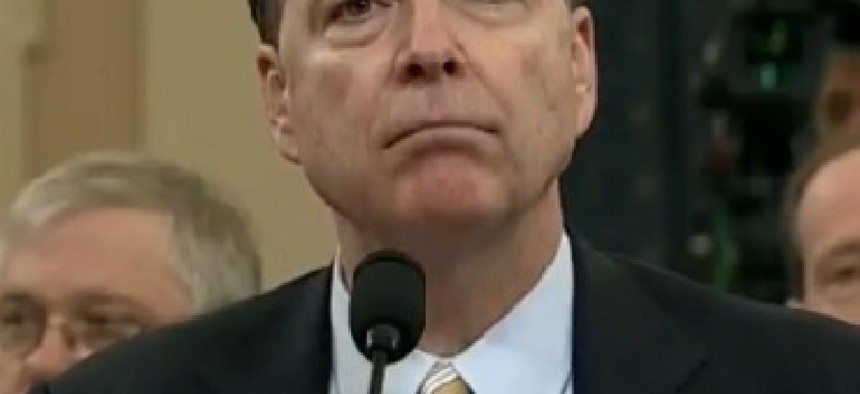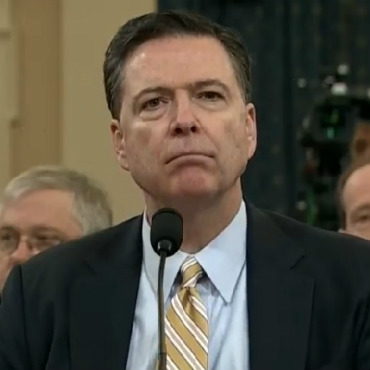Comey confirms FBI is investigating Trump-Russia links

FBI director James Comey also told the House intel panel there is no evidence to support President Trump's wiretapping tweets, and the FBI is investigating whether there was coordination between Trump campaign officials and associates and Russia.

FBI Director James Comey testified before Congress on the state of the ongoing investigation of Russian influence in the U.S. elections.
FBI Director James Comey told a House panel he was breaking protocol in announcing that the bureau has been actively investigating possible coordination between Trump campaign officials and associates and Russia since July 2016.
Only in recent weeks did the FBI inform members of Congress of the investigation due to the "sensitivity of the matter," Comey said in March 20 testimony before the House Permanent Select Committee on Intelligence.
The committee was holding its first public hearing to investigate the possibility of improper coordination between Russia and the Trump campaign, alleged leaks of classified information to the media and whether there was any unauthorized surveillance of Trump Tower.
On the third point, Comey and National Security Agency Director Admiral Michael Rogers were unequivocal in stating they had seen no information or evidence to support tweets by President Donald Trump claiming that President Barack Obama had ordered wiretaps at Trump Tower.
Comey said the Department of Justice asked him to convey that it had no information to support the tweets. Rogers further stated that the NSA did not ask Britain's Government Communications Headquarters to monitor Trump or his associates.
Beyond announcing that the FBI is conducting an investigation, Comey was unable to provide details of any individuals subject to the investigation or how long it will take to complete, and he repeatedly declined to answer questions, particularly from Democrats, about whether specific individuals in the Trump administration or who worked on his campaign were under investigation.
"I am trying to be studiously vague," Comey said, so as to not reveal any details or color the investigation going forward.
Republicans pressed Comey on his investigation into leaks of classified information to the media, and the FBI director repeatedly said he could not publicly comment on the veracity of leaked information. He did, however, state that leaking classified information is a crime that should be prosecuted.
Speaking in general terms, Comey cautioned that often what is leaked to the press is second or third hand. Such information can be inaccurate and might not actually be classified, he said, despite the media's characterization.
Very little of the five-plus-hour hearing was spent on questions about Russia's cyber and information operations during the U.S. election.
Comey did say that there was no evidence that Russian hackers were able to target or penetrate voting machines or tabulation systems.
"We saw efforts to penetrate voter registration databases, state boards of election," he said, but "we saw no efforts aimed at the vote itself."
Comey also acknowledged that Russia's hacking was not limited to the Democratic National Committee and the Clinton campaign.
"There were efforts to penetrate organizations associated with the Republican Party... and there were no releases of material taken, hacked from any Republican organizations," he said.
Rep. Will Hurd (R-Texas), a former CIA officer, pressed Comey on why it took 10 months from the time the FBI became aware of Russia's attempts to hack the DNC until a private firm hired by the DNC attributed the attack to Russia.
Comey said the FBI responded appropriately at the time, but looking back it could have been more forceful.
"We'd have sent up a much larger flare," he said. "We'd have just kept banging and banging on the door knowing what I know now." While Comey claimed the FBI "made extensive efforts" to alert the DNC, "I might have walked over there myself, knowing what I know now."
Rogers, meanwhile, warned that the U.S. needs to continue to learn lessons from Russia's information operations and harden defenses to prevent and deter Russia from future attacks.
"They have come to the conclusion it has generated a positive outcome," he said. "[T]hey'll be back."
Rogers said the U.S. must continue efforts to increase cybersecurity across all of government.
"I think we also need to have a discussion about just what for example does critical infrastructure mean in the 21st century," he said. "I don't think we traditionally would have thought of election infrastructure as critical."
He also stressed the importance of continued partnership between government agencies and the private sector. "That's the key to the future for me," he said.
NEXT STORY: NPPD reorg could make a comeback


